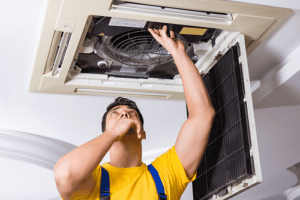Each model of heating and cooling system is distinct, but several important categories have significant differences between them. Your business needs a robust system that’s well-suited to your building, but how can you tell the difference between commercial building heating systems? Why do you specifically need a commercial system rather than a residential one that purports to be as efficient? Throughout this guide, we’ll address these and several other common questions from business owners when they consider the best ways to handle their heating needs during the winter.
Contrasting Residential and Commercial Building Heating Systems
 There are very few situations in which businesses can rely on residential heating systems. Generally, such companies are those run from a house or in an office that’s a converted residence. Office buildings typically have substantially different architecture, even down to the type and amount of insulation used. Retail businesses and many executive offices take these differences a step further with large, plate glass windows and other areas that increase exposure to the conditions outside. Residential systems lack the power to keep up with this demand.
There are very few situations in which businesses can rely on residential heating systems. Generally, such companies are those run from a house or in an office that’s a converted residence. Office buildings typically have substantially different architecture, even down to the type and amount of insulation used. Retail businesses and many executive offices take these differences a step further with large, plate glass windows and other areas that increase exposure to the conditions outside. Residential systems lack the power to keep up with this demand.
Commercial building heating systems, on the other hand, have substantially higher limits when it comes to building load. These systems are generally built to handle multiple areas using different thermostats. Commercial HVAC can grapple with rooms lacking adequate insulation and can accommodate entryways frequently exposed to cold conditions as customers enter or exit the building.
Common Kinds of Heating Systems for Commercial Enterprises
There are several kinds of heating systems. As you consider which heating system is ideal for your needs, a contractor will assess your building, how much space you have available around it, and what natural resources are nearby. Common systems include:
- Traditional Furnace – These systems tend to use oil or natural gas to heat air and send it through a series of ducts throughout your building. Depending on how large your system is, it may include multiple auxiliary fans that increase airflow or block off areas that are sufficiently heated.
- Heated Pipes – These systems include heat pumps and eschew ductwork in favor of a series of pipes running through the floors and walls. While they are more difficult and expensive to install, they are generally more efficient than furnace-based systems.
- Natural Systems – This group is a catchall for solar-powered heat pump systems, geothermal systems, and those that use nearby water sources as heat sinks. Such systems limit your energy costs when operating the system, but are frequently the most expensive to install and the most dependent on the land around your building.
To determine which system is right for you, we recommend consulting a qualified HVAC contractor to provide your options and anticipated costs.
The Benefits of Efficient System Operation
You want to ensure that your heating system is functioning correctly. It’s essential to recognize how this status benefits you, however, so you can appropriately gauge it as a priority. The benefits fall into several categories:
- Efficiency – It’s inescapable that utilities are expensive to keep going at all times, but a poorly functioning heating system will make the problem worse. Businesses rarely have such large margins and limitless income that they can afford to throw money after excessive heating bills. We encourage you to take advantage of your system’s high efficiency to keep your costs low.
- Performance – The point of an HVAC system is to keep the air at a comfortable level. When your system is working correctly, your customers, visitors, and staff are appropriately warm during the winter. This comfort provides a subtle cue to your employees that you care for them and is a necessary prerequisite for their job satisfaction. Nothing reduces morale like needing to wear a winter coat indoors.
- Organization – If you have a system that’s functioning correctly at all times, it means that you have a structure in place to consistently review its performance, conducting the necessary maintenance, and responsibly handling even the smallest tasks. The businesses that have a consistently working system are those that use maintenance checklists and have a corporate culture that inspires employees to follow through on their responsibilities.
Your business already paid good money to install your heating system in the first place, so take the time to maintain it properly and reap the rewards.
Finding the Ideal Assistance for Your Commercial Building Heating Systems
Whether you are working with new construction or it’s time to upgrade your old HVAC system, you need to speak with a trustworthy contractor to assess your situation. These professionals will review the surrounding land, building load, and utilities running to your building. Depending on these variables, they’ll recommend one of the different systems that we described above. Commercial building heating systems represent a significant investment, but when done right, you can reap the rewards for decades.

